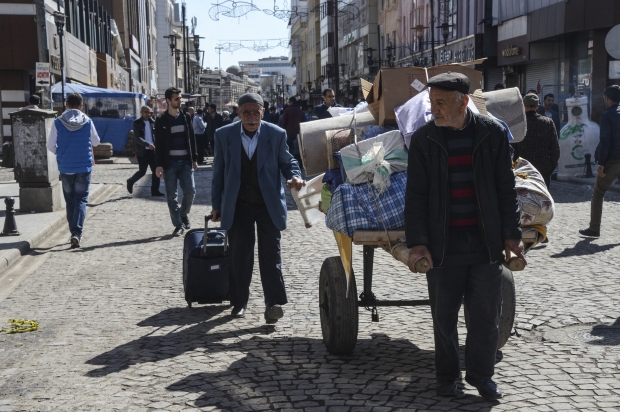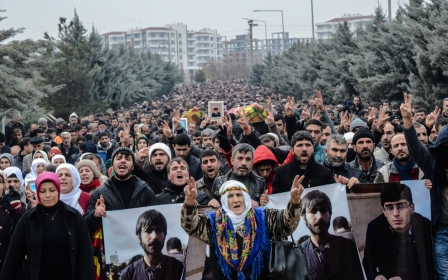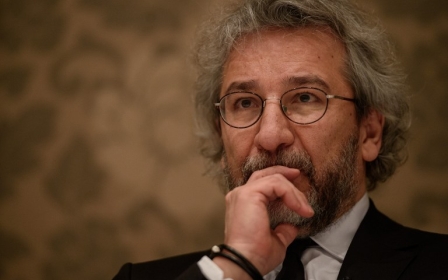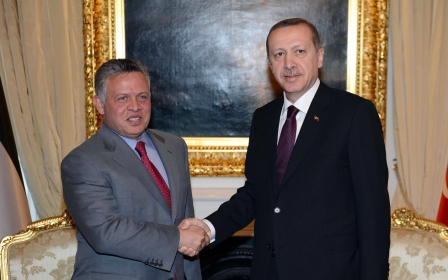ANALYSIS: Kurds lose faith in leaders as war rages in south
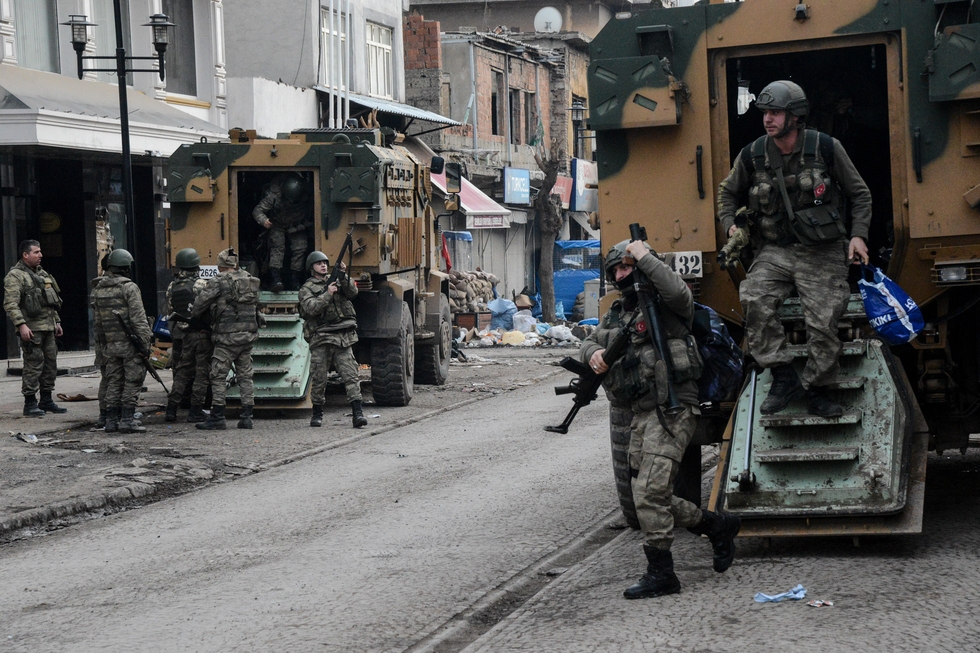
DIYARBAKIR, Turkey - Walking into the historic quarter of Diyarbakir is like entering a military occupation zone. Visitors are greeted by the sight of a rifle barrel jutting from a sandbagged sentry post, which is surrounded by security railings and armoured cars.
Police frisk all those wishing to enter, and all bags and suitcases are inspected. Luggage is carried as vehicles are not permitted inside. A hundred metres in, there is another checkpoint.
This is what four months of insurgency and curfew have brought upon Sur, the "Old City" of Diyarbakir, the principal Kurdish city in Turkey.
Fifty-nine civilians were killed as Turkish forces fought house-to-house battles against an estimated 150 fighters from the Kurdish Worker's Party (PKK), according to the crisis centre of the pro-Kurdish People’s Democratic Party (HDP).
The battle has cooled this month, the state’s overwhelming firepower having prevailed. But the rhetoric has not.
This week Murat Karayilan, the top PKK military commander, said the time has come for his troops to "intervene” in the war, which so far has mainly involved members of the PKK's youth wing.
And the city remains on edge.
Gultan Kisanak, the co-mayor of Diyarbakir, said that 50,000 residents of Sur had so far fled their homes, and half that number no longer have a home to return to.
There has been another cost as well. Kisanak’s party, the HDP, the third-biggest in Turkey's parliament with 59 MPs, has lost support among Kurds and Turks for its inability to curb the conflict.
“The HDP has become a spectator,” said Gareth Jenkins, a Turkey analyst and writer on Kurdish affairs. “The HDP is not achieving any results.”
During the battle in Sur, HDP co-leader Selahattin Demirtas called on people to stop building barricades and digging trenches as these only intensified the security forces’ response. The PKK rebuked Demirtas, and the barricade-building continued.
Demirtas then called for a march in which the Kurds of Diyarbakir would walk into Sur in their thousands, breaking the curfew through force of numbers. Not enough people turned out for the march to take place.
These setbacks were perhaps more an expression of the Kurds’ disenchantment with their leaders generally rather than a rejection of Demirtas.
People are “very angry” with both the PKK and the city council, said Mahmut Bozarslan. “I’ve worked as a journalist in Diyarbakir for 20 years and this is the first time that I’m hearing serious criticism of the PKK.”
“People are saying: ‘This is war, and it hurts. People had to leave their homes in the middle of winter. The city council didn’t do enough’.”
One of those forced to flee was Mehmet Varli, a tailor, who had to move house twice in four months. When fighting broke out in Sur in December, he left his home and shop for the district of Baglar. Then the state imposed a curfew on Baglar and Varli moved back to Sur, finding a room in a quieter part of the district.
On 21 March, the Kurds celebrated the biggest cultural event of their year, Newroz or New Year, on the outskirts of this city. People across Turkey hoped the HDP leadership would use the occasion to launch a peace initiative. After all, it was at Newroz in 2013 that the PKK announced the ceasefire which lasted until July last year.
“War, clashes and death are not a normal situation,’’ Demirtas told the crowd of at least 10,000 people in Newroz Park this year. “If the government insists on using guns, it will never reach its aim. If the government does not stop using guns, the PKK will not stop,” he said.
“We are ready to take the initiative, with all our friends, to return to the peace talks table again,” Demirtas said.
The filmmaker-turned-HDP legislator, Sirri Sureyya Onder, hit the government harder, accusing it of rejecting the party’s peace proposals. “Mr President,” Onder said, referring to Recep Tayyip Erdogan, “you promised to bring peace but you failed. Now there is war everywhere.”
But no speaker criticised the PKK.
Lawyer Sedat Yurtdas said it was unreasonable to have expected them to do so. The HDP “may have an influence on the PKK, but not a decisive one,” he said, so any politician bold enough to stand up to the PKK would run the risk of being ignored.
Nevertheless, Yurtdas, one of 22 Kurdish MPs evicted from parliament in 1992 after they were accused of being separatists, believes the HDP should press the PKK privately to change course. “If the street fighting continues, our people will continue dying,” he said.
The Newroz speeches were interspersed with videos of the PKK leader, Abdullah "Apo" Ocalan, who is now serving a life sentence for terrorism in a Turkish island prison. The videos showed him in a PKK camp before he was captured in 1999.
“The guerrillas are your fighters. You must support them whatever they do. If we want to get our freedom, a Kurdish state, we have to fight,” Ocalan said. The statement was in stark contrast to his comments in 2015, when he said the PKK's war was "unsustainable".
Other videos this year showed women and children building barricades with paving slabs pulled from the roads, while in another shot a PKK fighter with an RPG launcher could be seen standing behind a barricade, ready to fire.
Middle East Eye asked co-mayor Kisanak why such videos were screened when the speeches called for peace. She replied the question should be put to the Newroz organisers. “I guess they wanted to give the people hope, make them feel they are not helpless,” Kisanak said.
But the impression created was that the Kurdish leadership was vacillating between war and peace, not knowing which policy to throw its full weight behind.
Fuel on the fire
Since the PKK picked up arms against the Turkish state last July, President Erdogan has repeatedly stated that military operations would continue until “every terrorist is eliminated” - a government pledge that has not been achieved since the PKK rose up against the government in 1984.
And such proclamations have been met with a widening of the war - on 17 February and 13 March a branch of the PKK, the Kurdistan Freedom Falcons, exploded two car bombs in central Ankara, killing 29 and 36 people respectively.
After the second explosion, the PKK executive Cemil Bayik said that from now on “war will be waged everywhere in Turkey”.
Bayik said the PKK’s goal was to “bring down the AKP (Justice and Development Party) government.”
The liberal Turkish columnist Ozgur Korkmaz dismissed Bayik’s remark as “idiotic”, saying “only someone who has spent almost his entire life as an ardent militant living in the mountains could claim that killing civilians in the heart of the capital in a suicide attack would help a political cause”.
Many people in Diyarbakir condemned the Ankara bombings, but they would not blame them on the PKK. The Falcons are trained and financed by the PKK, according to Kurdish expert Jenkins. While they enjoy a certain “operational autonomy”, they follow the PKK’s guidelines.
A case in point was Jiyan Turk, a tall, elegant lady dressed in the red, green and yellow of the Kurdish flag at the Newroz celebration.
Asked why she was waving a banner with Ocalan’s face, when the Falcons recognise Ocalan as their overall leader, she said: “There is no connection between Apo and the (Ankara) bombings. Whatever happens, we love Apo.
“Without Apo, the government would have killed all the Kurds,” she added, a refrain one hears often in southeast Turkey.
Lawyer Yurtdas insists no Kurd would endorse the immorality of the Ankara bombings.
But, he says, the heart of the person in the street has been hardened by the death and destruction in Diyarbakir, Cizre and other southeast towns.
“There is a common opinion in eastern Turkey that western Turks don’t care about what happens in Sur and Cizre. They see the Falcons’ violence as a temporary phenomenon that is not related to the PKK’s permanent position,” Yurtdas said.
New MEE newsletter: Jerusalem Dispatch
Sign up to get the latest insights and analysis on Israel-Palestine, alongside Turkey Unpacked and other MEE newsletters
Middle East Eye delivers independent and unrivalled coverage and analysis of the Middle East, North Africa and beyond. To learn more about republishing this content and the associated fees, please fill out this form. More about MEE can be found here.


